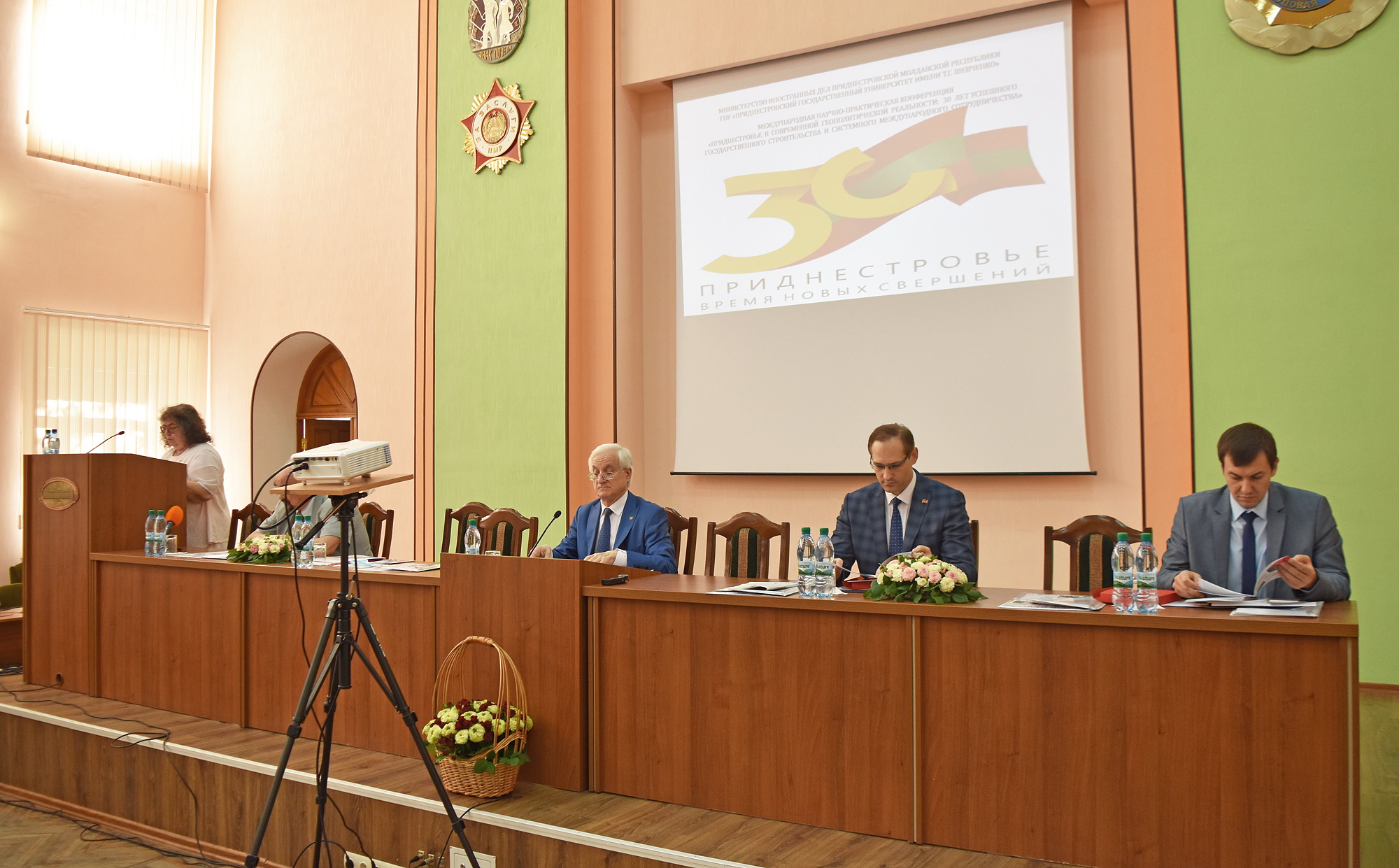On the eve of the 30th Anniversary of the republic the Pridnestrovian State University named after Taras Shevchenko gave the start to the International Scientific and Practical Conference "Pridnestrovie within the modern geopolitical reality: 30 years of successful state building and responsible participation in international cooperation", arranged by the Pridnestrovian Foreign Ministry and PSU. The event attended the Minister of Foreign Affairs of the PMR Vitaly Ignatiev, the First President of the PMR Igor Smirnov, State Advisor to the President of the PMR Anna Volkova, the rector of the University Stepan Beril, the heads of the official representations of Abkhazia and South Ossetia in Pridnestrovie Alexander Vataman and Vitaly Yankovsky, representatives of the executive authorities and the Supreme PMR Council, university teachers.
Once the conference opened, the State Adviser to the PMR President Anna Volkova voiced the welcoming speech of the PMR President Vadim Krasnoselsky: “On September 2, 1990, on the basis of citizens’ free will expression during referendums and gatherings, the delegates of the II Extraordinary Congress of Deputies of all levels proclaimed the foundation of the Pridnestrovian Moldavian Soviet Socialist Republic in the composition of the Soviet Union. A state to protected the Pridnestrovians’ right to live on their land, speak their native language, and protected human and civil rights, appeared. But in December 1991, the Soviet Union ceased to exist as a geopolitical reality. Based on the results of the referendum, the Pridnestrovian Moldavian Republic began developping along the path of independence. I am deeply convinced that the will of the Pridnestrovian people, expressed 30 years ago, deserves international recognition. For 30 years, we have not deviated a step from our priorities, strengthening the Pridnestrovian Moldavian Republic as a sovereign, independent, legal, democratic state”.
Welcoming addresses to the conference participants were also sent by the Chairman of the PMR Supreme Council Alexander Korshunov, Chairman of the PMR Government Alexander Martynov, First Deputy Chairman of the State Duma Committee for CIS Affairs, Eurasian Integration and Relations with Compatriots Konstantin Zatulin.
Within the framework of the event, the head of the PMR Foreign Ministry Vitaly Ignatiev made a report “The 30 years of Pridnestrovie on the foreign policy perimeter”. During his speech, he focused on key directions of the Pridnestrovian foreign policy, implemented during the period of the republic's independent development.
“The Pridnestrovian foreign policy was formed in extraordinary circumstances. In fact, we created a certain reaction to inadequate and negative influences that the then MSSR central authorities directed to the people of Pridnestrovie. The decisions made at that time on the language, nationalist slogans, attempts to divide people into several varieties were accompanied by powerful pressure and aggression. In these conditions, Pridnestrovie needed to develop international contacts. At first it was public and people's diplomacy, then gradually we formed a professional profile of the Pridnestrovian foreign policy - strong-willed, proactive and very dynamic. It has always been consistent, clear and understandable to our partners,” the head of the foreign policy department noted.
Speaking about the negotiation process with the Republic of Moldova, Vitaly Ignatiev drew attention to a number of fatal historical mistakes made by the neighboring state in relation to Pridnestrovie, including armed aggression and refusal to search for a formula for coexistence within one state entity. Currently, the Republic of Moldova, according to the diplomat, continues to make mistakes, sabotaging the dialogue with Pridnestrovie and refusing to fulfill even those agreements that are of a purely technical nature.
“For 26 years, the political dialogue with Moldova has been conducted, multivolume collections of documents, major protocol decisions, memorandums have been signed, which are not being implemented by the Moldovan side. In fact, we can say that throughout the entire period of the negotiation process and the search for a peaceful conflict settlement model, it was Moldova that was the weak link. We have never renounced dialogue, but this process cannot continue infinitely. Pridnestrovie cannot be hostage of one of the participants’ failure in the negotiations,” the PMR Foreign Minister stressed
In his speech, Vitaly Ignatiev also paid attention to the development of relations with the Russian Federation. According to him, when opening of the Official Representation of the PMR in Russia, the fraternal republics of the Caucasus, other states, and international organizations, including the OSCE and the UN have given a new dimension to these relations.
“We have no doubts that sooner or later the international community will come to the realization of the de facto existing Pridnestrovie and the need to formalize the existing reality de jure. Justice in this matter is on the Pridnestrovians’ side, only we have the right to determine our future. The international recognition of the republic is a matter of time and a successful geopolitical situation, which will sooner or later develop. Pridnestrovian diplomacy will continue to do everything possible to every year strengthen the world community’s awareness that it is simply impossible further ignoring the will of Pridnestrovians, who have been living independently for 30 years,” the diplomat concluded.
Also within the framework of the plenary session, the State Adviser to the President of the PMR Anna Volkova made a report on "Formation of the Pridnestrovian Moldavian Republic as an example of direct democracy".
Today, within the framework of the conference, a number of scientific and practical events are planned, including round tables on the topics: "Russia - Pridnestrovie: interaction and strategic partnership", "Priorities and potential for the development of the economy of Pridnestrovie as an independent state" and "Cultural, historical and recreational tourism in Pridnestrovie: investments and development prospects”.









